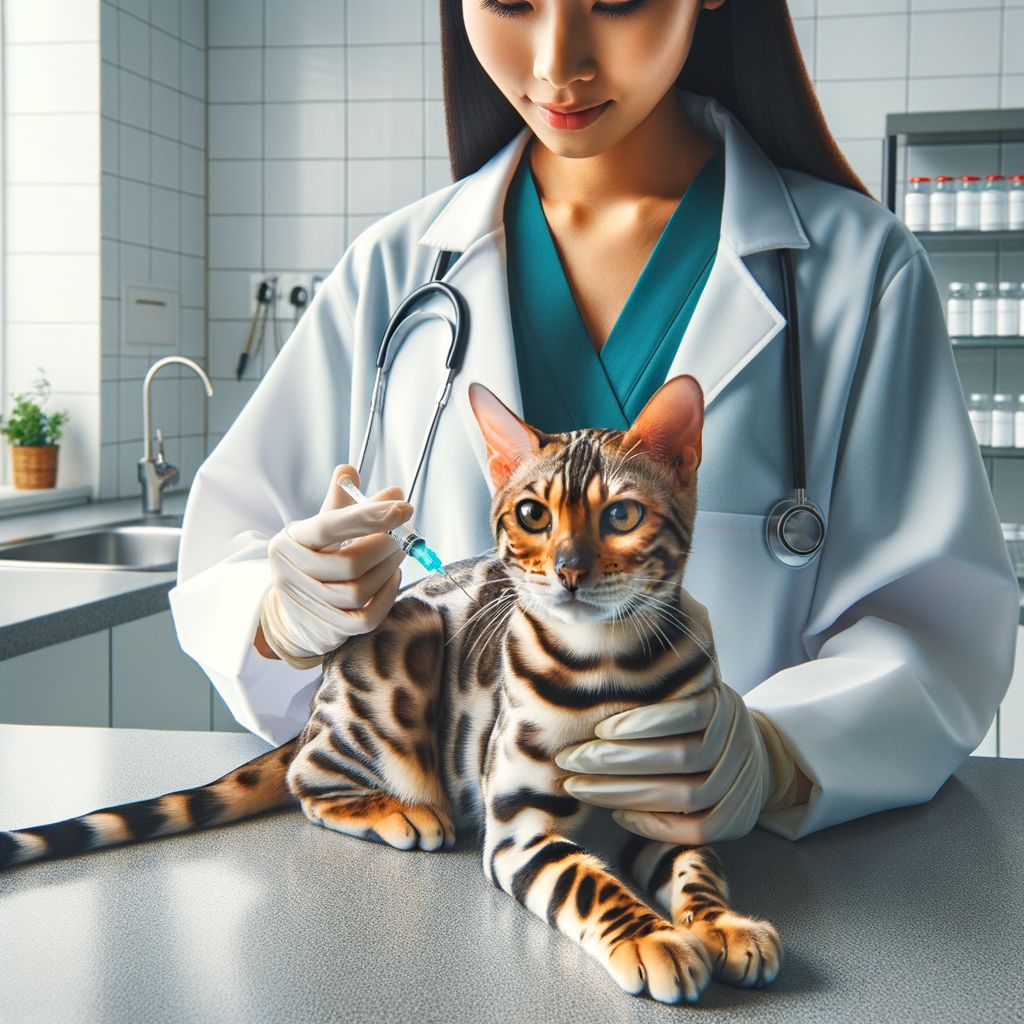
The Importance of Vaccinations for Bengal Cats
- Preventing diseases in Bengal cats: Vaccinations help protect Bengal cats from various diseases. These include feline leukemia, rabies, and feline distemper. By vaccinating your Bengal cat, you reduce the risk of them catching these illnesses.
- Boosting Bengal cat health: Vaccines not only prevent diseases but also improve overall health. A healthy cat is more active, playful, and happy. Regular vaccinations ensure that your Bengal cat stays in top shape.
- Ensuring longevity and vitality: Vaccinated cats tend to live longer and healthier lives. By keeping their immune system strong, you help them enjoy a life full of energy and vitality. This means more years of companionship and joy with your beloved pet.
Bengal Cat Vaccination Schedule
- Initial Kitten VaccinationsWhen your Bengal cat is a kitten, it needs several shots. These vaccines help protect against common diseases. The first set of shots usually starts at 6-8 weeks old. Your kitten will need booster shots every 3-4 weeks until they are about 16 weeks old.
Age Vaccine 6-8 weeks FVRCP (Feline Viral Rhinotracheitis, Calicivirus, Panleukopenia) 10-12 weeks FVRCP booster 14-16 weeks FVRCP booster, Rabies - Annual Adult Cat VaccinesOnce your Bengal cat is an adult, it will need yearly vaccines. These help keep your cat healthy and prevent diseases. The most common annual vaccines include FVRCP and Rabies.
Some vets may also recommend additional vaccines based on your cat’s lifestyle and health.
- Senior Bengal Cat ImmunizationsAs your Bengal cat gets older, its immune system may weaken. Senior cats still need vaccines to stay healthy. Your vet might suggest more frequent check-ups and booster shots.
Essential Vaccines for Bengal Cats
- Feline Distemper (Panleukopenia): This vaccine protects against a deadly virus that attacks the immune system. It is highly contagious and can spread quickly among cats.
- Feline Herpesvirus: This virus causes respiratory infections in cats. Symptoms include sneezing, runny nose, and eye discharge. The vaccine helps reduce the severity of these symptoms.
- Feline Calicivirus: This virus also causes respiratory infections. It can lead to mouth ulcers and joint pain. Vaccination helps protect your cat from severe illness.
- Rabies: Rabies is a deadly virus that affects the brain. It can be transmitted to humans. Vaccinating your Bengal cat against rabies is not only important for their health but also required by law in many areas.
Bengal Cat Veterinary Care
Regular Check-ups
Regular check-ups are essential for keeping your Bengal cat healthy. These visits help ensure your pet is in good shape and can catch any problems early.
- Importance of regular vet visits: Taking your Bengal cat to the vet regularly helps maintain their overall health. Vets can provide vaccinations, check for parasites, and offer advice on diet and exercise.
- Early detection of potential health issues: Regular check-ups allow vets to spot health problems before they become serious. Early detection can lead to more effective treatment and a better outcome for your cat.
| Check-up Frequency | Benefits |
|---|---|
| Every 6 months | Early detection of diseases, updated vaccinations, and overall health monitoring |
| Annually | Comprehensive health assessment, dental check, and weight management |
Importance of Deworming
- Preventing parasitic infections: Deworming helps to keep your Bengal cat free from worms. These parasites can cause serious health problems. Regular deworming ensures your cat stays safe from these infections.
- Keeping your Bengal cat healthy: A healthy Bengal cat is a happy cat. Deworming helps maintain your cat’s overall health. It prevents issues like weight loss, vomiting, and diarrhea. By deworming, you ensure your Bengal cat stays in top shape.
Case Study: The Impact of Vaccinations on Bengal Cat Health
-
Case Study 1: A Bengal Cat with Regular Vaccinations
Meet Bella, a 3-year-old Bengal cat. Bella has been receiving regular vaccinations since she was a kitten. Her owner, Jane, follows the recommended vaccination schedule strictly.
According to Jane, Bella has never had any serious health issues. She is active, playful, and has a shiny coat. Jane’s veterinarian confirms that Bella’s health is excellent, attributing it to her regular vaccinations.
In a study by the American Veterinary Medical Association, vaccinated cats like Bella are less likely to contract serious diseases. This is because vaccines help build immunity against common feline illnesses.
Health Aspect Observation General Health Excellent Activity Level High Coat Condition Shiny -
Case Study 2: A Bengal Cat without Regular Vaccinations
Now, let’s look at Max, another 3-year-old Bengal cat. Max’s owner, Tom, did not keep up with the recommended vaccination schedule. As a result, Max has faced several health issues.
Max has had respiratory infections and a dull coat. He is less active compared to Bella. Tom regrets not vaccinating Max regularly and now understands the importance of vaccinations.
Research shows that unvaccinated cats like Max are more prone to diseases. The Cat Health page on Wikipedia highlights the risks of not vaccinating pets.
Health Aspect Observation General Health Poor Activity Level Low Coat Condition Dull
Key Takeaways: Vaccinations for Bengal Cats
- Vaccinations are crucial for Bengal cat health: Vaccinations help protect your Bengal cat from various infectious diseases. These diseases can be severe and sometimes fatal. By vaccinating your cat, you ensure they have a better chance of living a long and healthy life.
- Regular veterinary care is essential: Regular check-ups with a veterinarian help monitor your Bengal cat’s health. Vets can spot early signs of illness and provide necessary treatments. This ongoing care is vital for maintaining your cat’s well-being.
- Preventive care can save your Bengal cat from serious diseases: Preventive measures, including vaccinations, can save your cat from diseases like feline leukemia, rabies, and feline distemper. These diseases are preventable with the right care and vaccines.






